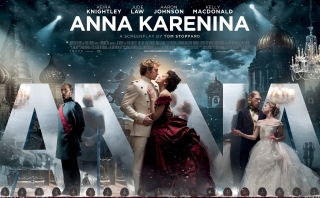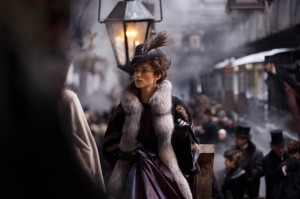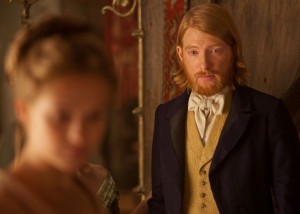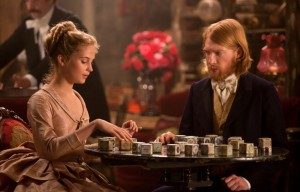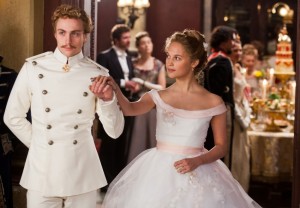WEIGHED DOWN BY GLITTERING JEWELS
Over-conceived and under-emoted, Joe Wright’s experimental Anna Karenina is art-directed to within both an inch of brilliance and an inch of death. This version of the Tolstoy novel indulges the British in three of their favorite pastimes: Stage, adapting novels, and pretending they’re Russian without actually performing Russian accents (how is it that the British loudly complain when an American misses their accent by a smidge, but they never, ever, ever even try to do a Russian one?) This Anna Karenina is taken from a novel which is turned into a play which is then turned into a movie. It’s not a normal play. It’s a lite-brite surreal spectacular—water colored, handcrafted, and mindful of being a fiction. It’s like My Fair Lady after falling asleep in the poppy field of The Wizard of Oz.
This is the sort of movie that’s hard on critics, because they spend so much time bellyaching about never seeing anything new. What do you do with a film that’s inventive but not clicking? Should you try to give the tie to the runner? But what if it just doesn’t work? What if, even worse, it only works in parts?
What’s not working here? Take the grand ball scene in Anna Karenina and compare it to the dance from Wright’s Pride and Prejudice that it mirrors. The dance in Anna Karenina has more cinematic flair, brilliantly emotive lighting, an overwhelming set design, lavish choreography, and prettier dresses. But it’s being whipped along entirely by music and technique, and not by emotion. It’s lacking heat, passion, and the joy of feeling love in one moment, qualities the simpler scene in Pride has in spades.
In a nutshell, this is the problematic arc of Wright’s career. Pride showed a beautiful connection between young love and expressive vision of the English countryside. That balance also remained through the first half of Atonement, but its second half showed the first steps toward over-design and cinematic showboating. The Soloist was a disaster, but Hanna looked like an inventive rebound. Now Karenina is back to excess. This has been the pattern for Wright—his films have gotten more grandiose while losing their romantic intimacy.
This tension is embedded in the performance of Aaron-Taylor Johnson (Savages) as the dandy Colonel Vronsky, whose performance could best be described as ornamental. In Pride and Prejudice, Matthew Macfadyen got the brooding romantic figure of Darcy, but here, Taylor-Johnson gives a theatrical performance, watered down in pose, isolated from the acting around him. That might be the idea—to highlight Vronsky’s shallowness—but it comes across as pantomime. He does rub off on Keira Knightley, who seems only slightly drowned by the decor.
It doesn’t help that the story asks a lot of its audience in offering sympathy to Anna. Just because you live in an oppressive social system doesn’t mean you’re not a narcissist. Her suicidal ending stacks the deck against her alleged oppressors. In real life, Anna wouldn’t throw herself in front of a train. She would just go on making the same mistakes with the same disregard for other people and screaming “oppression” when they didn’t like it. In a New York Times article, Wright disparages the usual take that “Anna is martyred, the victim of a patriarchal society.” But in the ending to Wright’s film, I don’t see the difference.
photos by Laurie Sparham
Anna Karenina
Universal Pictures, Focus Features, Working Title Films
rated PG-13
in wide release November 21, 2012
